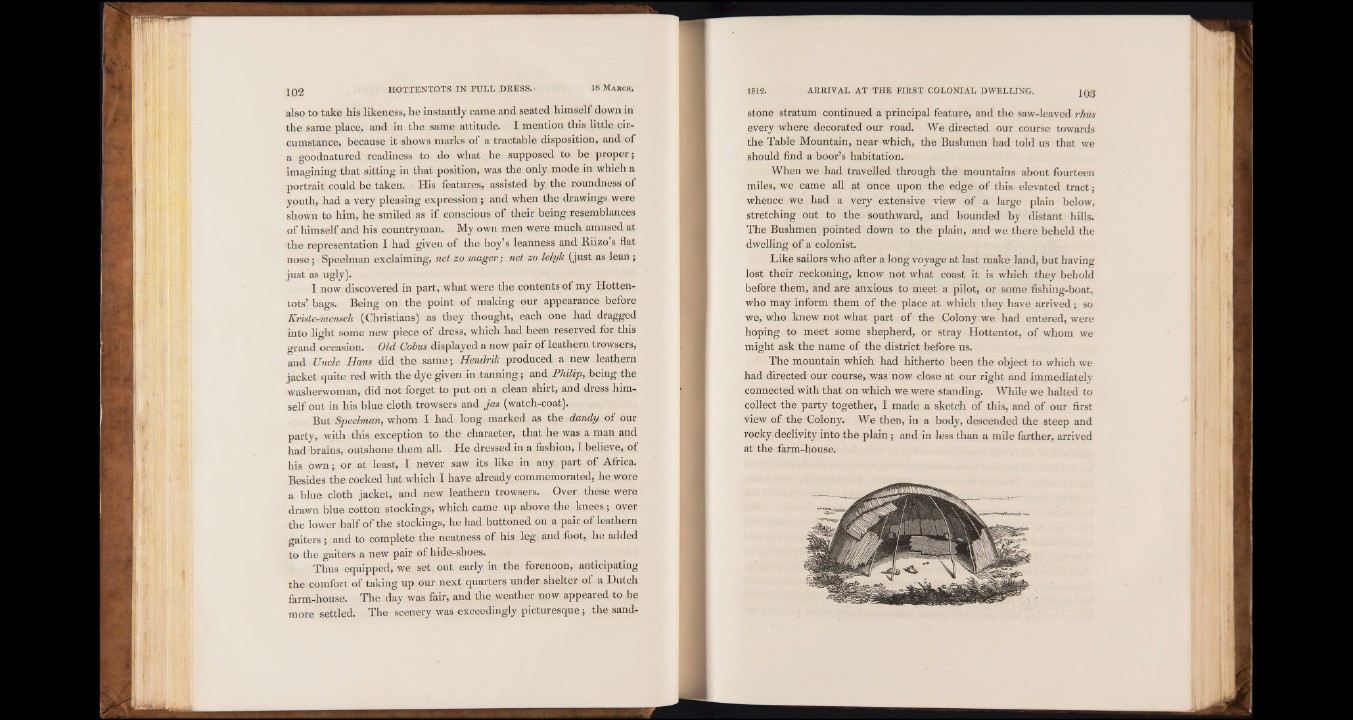
also to take his likeness, he instantly came and seated himself down in
the same place, and in the same attitude. I mention this little circumstance,
because it shows marks of a tractable disposition, and of
a goodnatured readiness to do what he supposed to be proper;
imagining that sitting in that position, was the only mode in which a
portrait could be taken. His features, assisted by, the roundness of
youth, had a very pleasing expression; and when the drawings were
shown to him, he smiled as if conscious of their being resemblances
of himself and his countryman. My own men were much amused at
the representation I had given of the boy’s leanness and Riizo s flat
nose; Speelman exclaiming, net zo mager; net zo lelyk (just as lean ;
just as ugly).
1 now discovered in part, what were the contents of my Hottentots’
bags. Being on the point of making our appearance before
Kriste-mensch (Christians) as they thought, each one had dragged
into light some new piece of dress, which had been reserved for this
grand occasion. Old Cobus displayed a new pair of leathern trowsers,
and Unde Ham did the same; Hendrik produced a new leathern
jacket quite red with the dye given in tanning; and Philip, being the
washerwoman, did not forget to put on a clean shirt, and dress himself
out in his blue cloth trowsers and jas (watch-coat).
But Speelman, whom I had long marked as the dandy of our
party, with this exception to the character, that he was a man and
had brains, outshone them all. He dressed in a fashion, I believe, of
his own; or at least, I never saw its like in any part of Africa.
Besides the cocked hat which I have already commemorated, he wore
a blue cloth jacket, and new leathern trowsers. Over these were
drawn blue cotton stockings, which came up above the knees; over
the lower half of the stockings, he had buttoned on a pair of leathern
gaiters ; and to complete the neatness of his leg and foot, he added
to the gaiters a new pair of hide-shoes.
Thus equipped, we set out early in the forenoon, anticipating
the comfort of taking up our next quarters under shelter of a Dutch
farm-house. The day was fair, and the weather now appeared to be
more settled. The scenery was exceedingly picturesque; the sandstone
stratum continued a principal feature, and the saw-leaved rhrn
every where decorated our road. We directed our course towards
the Table Mountain, near which, the Bushmen had told us that we
should find a boor’s habitation.
When we had travelled through the mountains about fourteen
miles, we came all at once upon the edge of this elevated tract;
whence we had a very extensive view of a large plain below,
stretching out to the southward, and bounded by distant hills.
The Bushmen pointed down to the plain, and we there beheld the
dwelling of a colonist.
Like sailors who after a long voyage at last make land, but having
lost their reckoning, know not what coast it is which they behold
before them, and are anxious to meet a pilot, or some fishing-boat,
who may inform them of the place at which they have arrived; so
we, who knew not what part of the Colony we had entered, were
hoping to meet some shepherd, or stray Hottentot, of whom we
might ask the name of the district before us.
The mountain which had hitherto been the object to which we
had directed our course, was now close at our right and immediately
connected with that on which we were standing. While we halted to
collect the party together, I made a sketch of this, and of our first
view of the Colony. We then, in a body, descended the steep and
rocky declivity into the plain; and in less than a mile farther, arrived
at the farm-house.